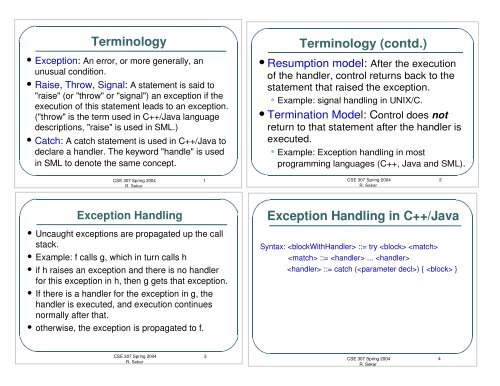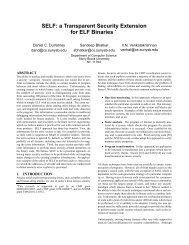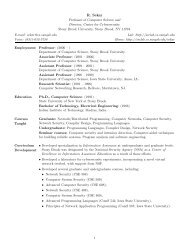Exception Handling in C++/Java
Exception Handling in C++/Java
Exception Handling in C++/Java
You also want an ePaper? Increase the reach of your titles
YUMPU automatically turns print PDFs into web optimized ePapers that Google loves.
Term<strong>in</strong>ology<br />
<strong>Exception</strong>: An error, or more generally, an<br />
unusual condition.<br />
Raise, Throw, Signal: A statement is said to<br />
"raise" (or "throw" or "signal") an exception if the<br />
execution of this statement leads to an exception.<br />
("throw" is the term used <strong>in</strong> <strong>C++</strong>/<strong>Java</strong> language<br />
descriptions, "raise" is used <strong>in</strong> SML.)<br />
Catch: A catch statement is used <strong>in</strong> <strong>C++</strong>/<strong>Java</strong> to<br />
declare a handler. The keyword "handle" is used<br />
<strong>in</strong> SML to denote the same concept.<br />
Term<strong>in</strong>ology (contd.)<br />
Resumption model: After the execution<br />
of the handler, control returns back to the<br />
statement that raised the exception.<br />
• Example: signal handl<strong>in</strong>g <strong>in</strong> UNIX/C.<br />
Term<strong>in</strong>ation Model: Control does not<br />
return to that statement after the handler is<br />
executed.<br />
• Example: <strong>Exception</strong> handl<strong>in</strong>g <strong>in</strong> most<br />
programm<strong>in</strong>g languages (<strong>C++</strong>, <strong>Java</strong> and SML).<br />
CSE 307 Spr<strong>in</strong>g 2004<br />
R. Sekar<br />
1<br />
CSE 307 Spr<strong>in</strong>g 2004<br />
R. Sekar<br />
2<br />
<strong>Exception</strong> <strong>Handl<strong>in</strong>g</strong><br />
Uncaught exceptions are propagated up the call<br />
stack.<br />
Example: f calls g, which <strong>in</strong> turn calls h<br />
if h raises an exception and there is no handler<br />
for this exception <strong>in</strong> h, then g gets that exception.<br />
If there is a handler for the exception <strong>in</strong> g, the<br />
handler is executed, and execution cont<strong>in</strong>ues<br />
normally after that.<br />
otherwise, the exception is propagated to f.<br />
<strong>Exception</strong> <strong>Handl<strong>in</strong>g</strong> <strong>in</strong> <strong>C++</strong>/<strong>Java</strong><br />
Syntax: ::= try <br />
::= ... <br />
::= catch () { }<br />
CSE 307 Spr<strong>in</strong>g 2004<br />
R. Sekar<br />
3<br />
CSE 307 Spr<strong>in</strong>g 2004<br />
R. Sekar<br />
4
<strong>Exception</strong> <strong>Handl<strong>in</strong>g</strong> <strong>in</strong> <strong>C++</strong>/<strong>Java</strong>(contd.)<br />
Example:<br />
<strong>in</strong>t fac(<strong>in</strong>t n) {<br />
if (n 15) throw ("n too large");<br />
else return n*fac(n-1); }<br />
void g (<strong>in</strong>t n) { <strong>in</strong>t k;<br />
try { k = fac (n) ;}<br />
catch (<strong>in</strong>t i) { cout
Implementation of <strong>Exception</strong> <strong>Handl<strong>in</strong>g</strong> <strong>in</strong><br />
Programm<strong>in</strong>g Languages<br />
<strong>Exception</strong> handl<strong>in</strong>g can be implemented by<br />
add<strong>in</strong>g "markers" to ARs to <strong>in</strong>dicate the po<strong>in</strong>ts <strong>in</strong><br />
program where exception handlers are available.<br />
Enter<strong>in</strong>g a try-block at runtime would cause such<br />
a marker to be put on the stack<br />
When exception arises, the RTE gets control and<br />
searches down from stack top for a marker.<br />
<strong>Exception</strong> then "handed" to the catch statement<br />
of this try-block that matches the exception<br />
If no match<strong>in</strong>g catch statement is present, search<br />
for a marker is cont<strong>in</strong>ed further down the stack<br />
Heap management<br />
Issues<br />
• No LIFO property, so management is difficult<br />
• Fragmentation<br />
• Locality<br />
Models<br />
• Explicit allocation and free (C, <strong>C++</strong>)<br />
• Explicit allocation, automatic free (<strong>Java</strong>)<br />
• Automatic allocation and free (SML, Python,<br />
<strong>Java</strong>script)<br />
CSE 307 Spr<strong>in</strong>g 2004<br />
R. Sekar<br />
9<br />
CSE 307 Spr<strong>in</strong>g 2004<br />
R. Sekar<br />
10<br />
Fragmentation<br />
Internal fragmentation<br />
• When asked for x bytes, allocator returns y > x<br />
bytes; y-x represents <strong>in</strong>ternal fragmentation<br />
External fragmentation<br />
• When (small) free blocks of memory occur <strong>in</strong><br />
between used blocks<br />
• the memory manager may have a total >> N bytes of free<br />
memory available, but none may be large enough to<br />
satisfy a request of size N.<br />
Reduc<strong>in</strong>g Fragmentation<br />
Use blocks of s<strong>in</strong>gle size (early LISP)<br />
• Limits data-structures to use less efficient implementations.<br />
Use b<strong>in</strong>s of fixed sizes, e.g., 2 n for n=0,1,2,...<br />
• When you run out of blocks of a certa<strong>in</strong> size, break up a block<br />
of next available size<br />
• Elim<strong>in</strong>ates external fragmentation, but <strong>in</strong>creases <strong>in</strong>ternal<br />
fragmentation<br />
Ma<strong>in</strong>ta<strong>in</strong> b<strong>in</strong>s as LIFO lists to <strong>in</strong>crease locality<br />
malloc implementations (Doug Lea)<br />
• For small blocks, use b<strong>in</strong>s of size 8k bytes, 0 < k < 64<br />
• For larger blocks, use b<strong>in</strong>s of sizes 2 n for n > 9<br />
CSE 307 Spr<strong>in</strong>g 2004<br />
R. Sekar<br />
11<br />
CSE 307 Spr<strong>in</strong>g 2004<br />
R. Sekar<br />
12
Coalesc<strong>in</strong>g<br />
What if a program allocates many 8 byte chunks,frees<br />
them all and then requests lots of 16 byte chunks?<br />
• Need to coalesce 8-byte chunks <strong>in</strong>to 16-byte chunks<br />
• Requires additional <strong>in</strong>formation to be ma<strong>in</strong>ta<strong>in</strong>ed<br />
• for allocated blocks: where does the current block end,<br />
and whether the next block is free<br />
Explicit Vs Implicit Management<br />
Explicit memory management can be more<br />
efficient, but takes a lot of programmer effort<br />
Programmers often ignore memory management<br />
early <strong>in</strong> cod<strong>in</strong>g, and try to add it later on<br />
• But this is very hard, if not impossible<br />
Result:<br />
• Majority of bugs <strong>in</strong> production code is due to memory<br />
management errors<br />
• Memory leaks<br />
• Null po<strong>in</strong>ter or un<strong>in</strong>italized po<strong>in</strong>ter access<br />
• Access through dangl<strong>in</strong>g po<strong>in</strong>ters<br />
CSE 307 Spr<strong>in</strong>g 2004<br />
R. Sekar<br />
13<br />
CSE 307 Spr<strong>in</strong>g 2004<br />
R. Sekar<br />
14<br />
Manag<strong>in</strong>g Manual Deallocation<br />
How to avoid errors due to manual deallocation<br />
of memory<br />
• Never free memory!!!<br />
• Use a convention of object ownership (owner<br />
responsible for free<strong>in</strong>g objects)<br />
• Tends to reduce errors, but still requires a careful design from<br />
the beg<strong>in</strong>n<strong>in</strong>g. (Cannot ignore memory deallocation concerns<br />
<strong>in</strong>itially and add it later.)<br />
• Smart data structures, e.g., reference count<strong>in</strong>g objects<br />
• Region-based allocation<br />
• When a bunch of objects hav<strong>in</strong>g equal life time are allocated<br />
Garbage Collection<br />
Garbage collection aims to avoid problems<br />
associated with manual deallocation<br />
• Identify and collect garbage automatically<br />
What is garbage?<br />
• Unreachable memory<br />
Automatic garbage collection techniques<br />
have been developed over a long time<br />
• S<strong>in</strong>ce the days of LISP (1960s)<br />
CSE 307 Spr<strong>in</strong>g 2004<br />
R. Sekar<br />
15<br />
CSE 307 Spr<strong>in</strong>g 2004<br />
R. Sekar<br />
16
Garbage Collection Techniques<br />
Reference Count<strong>in</strong>g<br />
• Works if there are no cyclic structures<br />
Mark-and-sweep<br />
Generational collectors<br />
Issues<br />
• Overhead (memory and space)<br />
• Pause-time<br />
• Locality<br />
Reference Count<strong>in</strong>g<br />
Each heap block ma<strong>in</strong>ta<strong>in</strong>s a count of the<br />
number of po<strong>in</strong>ters referenc<strong>in</strong>g it.<br />
Each po<strong>in</strong>ter assignment<br />
<strong>in</strong>crements/decrements this count<br />
Deallocation of a po<strong>in</strong>ter variable decrements<br />
this count<br />
When reference count becomes zero, the<br />
block can be freed<br />
CSE 307 Spr<strong>in</strong>g 2004<br />
R. Sekar<br />
17<br />
CSE 307 Spr<strong>in</strong>g 2004<br />
R. Sekar<br />
18<br />
Reference Count<strong>in</strong>g<br />
Disadvantages<br />
• Does not work with cyclic structures<br />
• May impact locality<br />
• Increases cost of each po<strong>in</strong>ter update operation<br />
Advantages<br />
• Overhead is predictable, fixed<br />
• Garbage is collected immediately, so more<br />
efficient use of space<br />
Mark-and-Sweep (“Trace-based”)<br />
Mark every allocated heap block as<br />
“unreachable”<br />
Start from registers, local and global<br />
variables<br />
Do a DFS, follow<strong>in</strong>g the po<strong>in</strong>ters<br />
• Mark each heap block visited as “reachable”<br />
At the end of the sweep phase, reclaim all<br />
heap blocks still marked as unreachable<br />
CSE 307 Spr<strong>in</strong>g 2004<br />
R. Sekar<br />
19<br />
CSE 307 Spr<strong>in</strong>g 2004<br />
R. Sekar<br />
20
Issues with GC<br />
Memory fragmentation<br />
• Memory pages may become sparsely populated<br />
• Performance will be hit due to excessive virtual<br />
memory usage and page faults<br />
• Can be a problem with explicit memory<br />
management as well<br />
Solution:<br />
• Compact<strong>in</strong>g GC<br />
• Copy live structures so that they are contiguous<br />
• Copy<strong>in</strong>g GC<br />
CSE 307 Spr<strong>in</strong>g 2004<br />
R. Sekar<br />
21<br />
Copy<strong>in</strong>g Collection<br />
Instead of do<strong>in</strong>g a sweep, simply copy over<br />
all reachable heap blocks <strong>in</strong>to a new area<br />
After the copy<strong>in</strong>g phase, all orig<strong>in</strong>al blocks<br />
can be freed<br />
Now, memory is compacted, so pag<strong>in</strong>g<br />
performance will be much better<br />
Needs up to twice the memory of compact<strong>in</strong>g<br />
collector, but can be much faster<br />
• Reachable memory is often a small fraction of total<br />
memory<br />
CSE 307 Spr<strong>in</strong>g 2004<br />
R. Sekar<br />
22<br />
Generational GC<br />
Take advantage of the fact that most objects<br />
are short-lived<br />
Exploit this fact to perform GC faster<br />
Idea:<br />
• Divide heap <strong>in</strong>to generations<br />
• If all references go from younger to older generation<br />
(as most do), can collect youngest generation w/o<br />
scann<strong>in</strong>g regions occupied by other generations<br />
• Need to track references from older to younger generation<br />
to make this work <strong>in</strong> all cases<br />
Garbage collection <strong>in</strong> <strong>Java</strong><br />
Generational GC for young objects<br />
“Tenured” objects stored <strong>in</strong> a second region<br />
• Use mark-and-sweep with compact<strong>in</strong>g<br />
Makes use of multiple processors if available<br />
References<br />
• http://java.sun.com/javase/technologies/hotspot/gc/gc_tun<strong>in</strong>g_<br />
• http://www.ibm.com/developerworks/java/library/j-jtp11253/<br />
CSE 307 Spr<strong>in</strong>g 2004<br />
R. Sekar<br />
23<br />
CSE 307 Spr<strong>in</strong>g 2004<br />
R. Sekar<br />
24
GC for C/<strong>C++</strong><br />
Cannot dist<strong>in</strong>guish between po<strong>in</strong>ters and nonpo<strong>in</strong>ters<br />
• Need “conservative garbage collection”<br />
The idea: if someth<strong>in</strong>g “looks” like a po<strong>in</strong>ter, assume<br />
that it may be one!<br />
• Problem: works for f<strong>in</strong>d<strong>in</strong>g reachable objects, but cannot<br />
modify a value without be<strong>in</strong>g sure<br />
• Copy<strong>in</strong>g and compaction are ruled out!<br />
Reasonable GC implementations are available, but<br />
they do have some drawbacks<br />
• Unpredictable performance<br />
• Can break some programs that modify po<strong>in</strong>ter values before<br />
stor<strong>in</strong>g them <strong>in</strong> memory<br />
CSE 307 Spr<strong>in</strong>g 2004<br />
R. Sekar<br />
25





